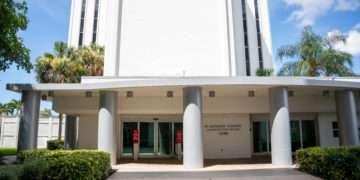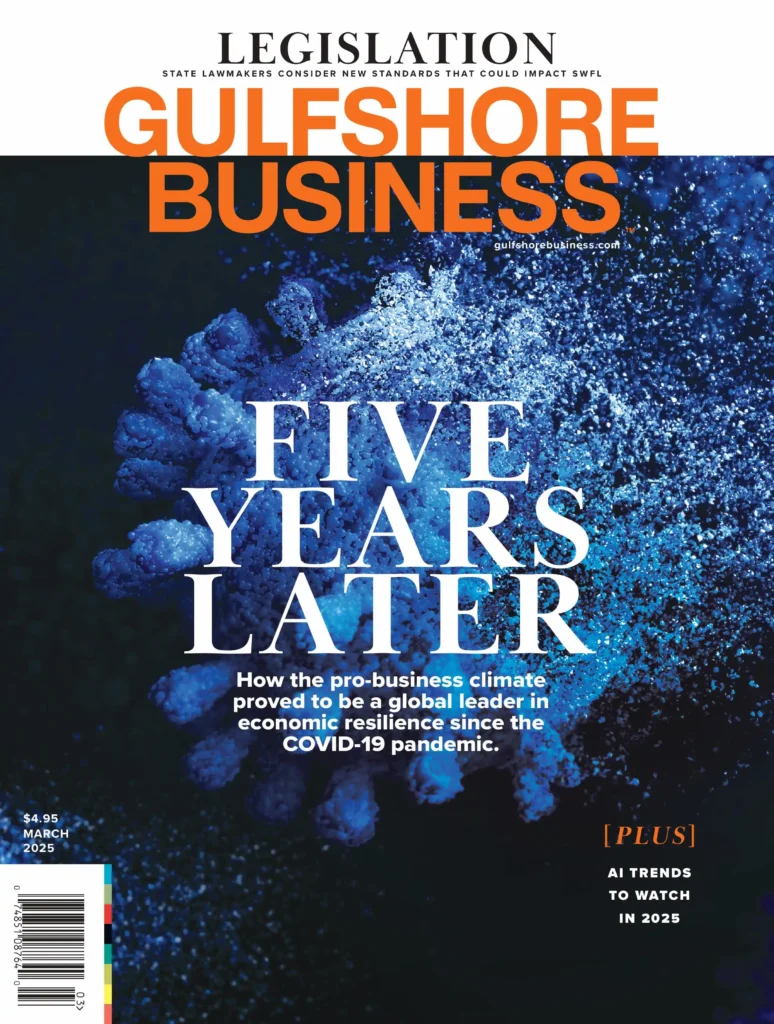His face caked with sunscreen, his eyes protected by sunglasses and his arms covered in a bright blue and branded Sanibel Captiva Community Bank fishing shirt, CEO Craig Albert looked like he was getting ready for a fishing trip.
Instead, he was leading a boatload of eight bank employees Wednesday to the main branch off Periwinkle Way on Sanibel Island. They brought with them barbecue supplies to feed their island-bound clients while serving them in front of the building being gutted at 2406 Periwinkle Way, which had about an inch and a half of floodwaters.
The other Sanibel branch, at 1037 Periwinkle Way, fared worse. It had about six feet of storm surge inside and will be out of commission for much longer.
Two weeks to the day after Hurricane Ian slammed into Sanibel Island, Albert and his team are experiencing incremental progress. They get a little done each day, and after 14 days, a little adds up to a lot.
Five of Sanibel Captiva Community Bank’s six mainland branches are operating, business as usual, serving their clients across Southwest Florida. Although the bank serves the entire region, its roots run deep on the island community. 
All 109 of the bank’s employees survived the storm. About 10% of them suffered severe damage to their homes.
“The bank has found homes for all of our displaced employees, and we’re going to help with their housing for the rest of the year,” bank president Kyle DeCicco said. “I have not heard of one customer out there who is throwing in the towel. Not a single one. That tells you about the resiliency of the community.”
This includes Albert, whose Sanibel home has been gutted of all the ground floor drywall. The piles of discarded drywall, three inches of mud excavated from the ground floor and anything that got wet inside were piled outside, a giant heap of garbage, waiting for pickup.
Albert gave Gulfshore Business a tour of the ruined parts of his home, not for any sort of a pity party, but to show a glimpse of what most of the island’s 6,500 homeowners will be experiencing.
“The closer you get to the beach, the more devastating it gets,” Albert said. “The water line in my house was over my head.
“You just try to get a little bit done each day. There’s so much devastation. You have to take it one step at a time. So much progress has already been made.”
Albert has work crews and an electrician tending to his home, where he intends to relocate and camp soon. That will give him a better vantage point to oversee the reconstruction and refurbishing of the island’s two branches.
“The team’s fantastic,” Albert said. “We’ve had multiple boat rides out here. Bringing supplies out. Bringing food. We’re grilling hot dogs and hamburgers for the islanders who are here.
“We’re trying to provide some hope here. We’re open. A few people around here, they’ve cashed some checks. Some people wanted to check their safety deposit boxes, so we’ve been able to let them do that.”
Albert’s optimism has spread.
“Yesterday, I was on the water, watching the convoy drive over,” DeCicco said of the power trucks that drove over the temporary repairs made to the Sanibel Causeway. Residents are expected to be allowed to use the repaired bridge on Oct. 21. For now, access is restricted to worker trucks. 
“Sanibel is going to rebuild quickly,” DeCicco said. “There’s a lot of wealth on that island. The money is going to go there.”
The site of trucks crossing the causeway also moved Albert.
“I was almost crying to be honest,” Albert said. “Because that’s our umbilical cord.”
Many of the bank’s employees are shifting in their roles. Bank tellers like Alex Martinez and Dennis Morgan were carrying supplies.
Branch manager Mona Strasser was fielding calls from her cell phone.
“The community is coming together,” Strasser said. “It’s still hard to process everything.”
Kyle Dieckman, a loan coordinator, is serving as the bank’s boat captain. He is a member of the U.S. Coast Guard reserves, and Albert has nicknamed him “MacGyver,” after the TV show character who has a handy knack for getting out of trouble.
“I’m basically a Swiss Army knife,” said Dieckman, who after piloting the boat tended to the hot dogs and burgers on the grill.
Jonathan Ruiz, the senior vice president and director of IT, has been coordinating the gutting of the building with Belfor, a disaster response company.
“When I talked to Belfor, I was trying to see if we could salvage any of this,” Ruiz said, pointing to the piles of office furniture that still appeared to be in pristine condition. They told him, no, because the surging water was packed with bacteria. They called it “Grade Three” water. “It would just corrode from the inside, so we had to get everything out of there.”
David Wright, the senior vice president, oversees residential lending. He’s doing parts of his job remotely, too. He leads a staff of seven loan officers and 12 support team members. Last year, the bank processed $266 million in residential home loans across Southwest Florida. This year, the bank was on pace to hit $300 million until Hurricane Ian hit.
The bank started in 2003 with $30 million in assets. It now has $729 million in assets, $736 million in loans and $469 million in deposits.
Todd Smith, a Sanibel resident, swung by the canopy. He needed to withdraw $3,000 from his checking account to pay a crew of workers at his house. Albert went inside and handled the transaction himself.
Marty Harrity, a former Sanibel mayor and the owner of the Doc Ford’s restaurants, is a Sanibel Captiva Community Bank customer. His wife, Brenda Harrity, traveled to the island on the boat with the bank staff and granted them use of her dock. Marty Harrity said he could not be happier with the bank’s service.
“You want to talk about taking charge,” he said. “Their culture is so much like ours. Their service and the way they treat their customers. You talk about optimism. That breeds.”





